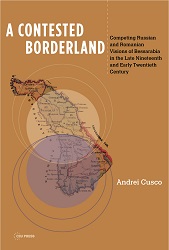A Contested Borderland. Competing Russian and Romanian Visions of Bessarabia in the Late Nineteenth and Early Twentieth Century
A Contested Borderland. Competing Russian and Romanian Visions of Bessarabia in the Late Nineteenth and Early Twentieth Century
Author(s): Andrei Cuşco
Subject(s): History, Diplomatic history, Political history
ISSN: 2306-3637
Published by: Central European University Press
Keywords: Bessarabia;foreign relations;Russia;Romania;20th century history;
Summary/Abstract: Bessarabia―mostly occupied by modern-day republic of Moldova―was the only territory representing an object of rivalry and symbolic competition between the Russian Empire and a fully crystallized nation-state: the Kingdom of Romania. This book is an intellectual prehistory of the Bessarabian problem, focusing on the antagonism of the national and imperial visions of this contested periphery. Through a critical reassessment and revision of the traditional historical narratives, the study argues that Bessarabia was claimed not just by two opposing projects of ‘symbolic inclusion,’ but also by two alternative and theoretically antagonistic models of political legitimacy.By transcending the national lens of Bessarabian / Moldovan history and viewing it in the broader Eurasian comparative context, the book responds to the growing tendency in recent historiography to focus on the peripheries in order to better understand the functioning of national and imperial states in the modern era.Bessarabia―mostly occupied by modern-day republic of Moldova―was the only territory representing an object of rivalry and symbolic competition between the Russian Empire and a fully crystallized nation-state: the Kingdom of Romania. This book is an intellectual prehistory of the Bessarabian problem, focusing on the antagonism of the national and imperial visions of this contested periphery. Through a critical reassessment and revision of the traditional historical narratives, the study argues that Bessarabia was claimed not just by two opposing projects of ‘symbolic inclusion,’ but also by two alternative and theoretically antagonistic models of political legitimacy.By transcending the national lens of Bessarabian / Moldovan history and viewing it in the broader Eurasian comparative context, the book responds to the growing tendency in recent historiography to focus on the peripheries in order to better understand the functioning of national and imperial states in the modern era.
- E-ISBN-13: 978-963-386-160-8
- Print-ISBN-13: 978-963-386-159-2
- Page Count: 345
- Publication Year: 2017
- Language: English
- eBook-PDF
- Table of Content
- Introduction

